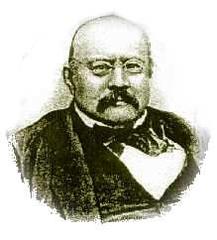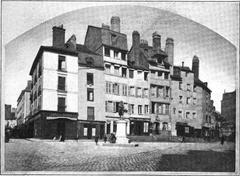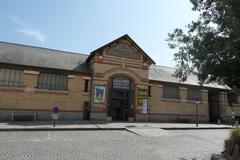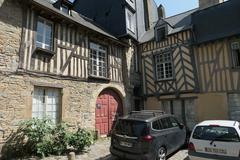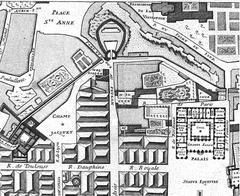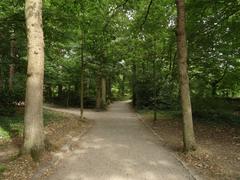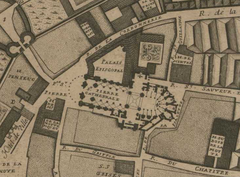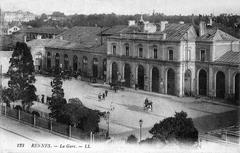
Rennes City Hall: Visiting Hours, Tickets, and Historical Sites Guide
Date: 04/07/2025
Introduction: Rennes City Hall at the Heart of Brittany
Rennes City Hall (Hôtel de Ville), located on the bustling Place de la Mairie, stands as a prominent symbol of Rennes’ civic resilience, historical depth, and architectural grandeur. Rebuilt after the Great Fire of 1720, the City Hall exemplifies French Baroque and neoclassical design, thanks to royal architect Jacques Gabriel. With its harmonious curved façade, central clock tower, and iconic onion-shaped dome, the building anchors Rennes’ cultural and political center. Today, visitors can explore both its exterior and select interior spaces, enjoy guided tours, and appreciate its proximity to other Rennes historical sites such as the Parliament of Brittany and the medieval old town. For up-to-date details on Rennes City Hall visiting hours, tickets, and tours, official tourism resources provide comprehensive guidance (Nomads Travel Guide; Bonadvisor; France-Voyage).
Table of Contents
- Early Foundations and Medieval Rennes
- The Great Fire of 1720 and Urban Transformation
- Construction and Architecture of Rennes City Hall
- Civic and Political Symbolism
- From Revolution to Modern Times
- Monument Historique Status
- Visiting Hours, Tickets, and Accessibility
- Travel Tips and Nearby Attractions
- Guided Tours and Unique Experiences
- FAQs for Visitors
- Key Architectural Features
- Essential Facts and Dates
Early Foundations and Medieval Rennes
Rennes’ origins trace back to Celtic and Roman settlements at the confluence of the Ille and Vilaine rivers. Known as Condate in Roman times, the city developed into a major administrative and political center in Brittany. Throughout the Middle Ages, Rennes vied with Nantes for the title of ducal capital. The medieval cityscape featured timber-framed houses and fortified ramparts, some of which still stand in the historic center (Facts.net; Celtic Wanderlust).
The Great Fire of 1720 and Urban Transformation
A devastating fire in December 1720 destroyed over 900 homes and much of the northern quarter, prompting a complete reimagining of the city’s urban landscape. City leaders, under Toussaint-François Rallier du Baty, invited Isaac Robelin to draft a masterplan focused on fire-resistant stone construction, wide streets, and classical symmetry (Wikipedia; Forbes).
Construction and Architecture of Rennes City Hall
The new City Hall was envisioned as the centerpiece of the rebuilt city. Jacques Gabriel’s design, completed between 1734 and 1743, broke with the medieval past and embraced Enlightenment ideals. The building’s curved façade, central clock tower, and symmetrical wings were constructed in elegant ashlar stone, unifying city administration and the civil court under one roof. The onion-shaped dome atop the belfry remains a distinctive feature of the Rennes skyline (Nomads Travel Guide; RouteYou).
Civic and Political Symbolism
The architectural choices of Rennes City Hall reflect stability, order, and civic pride. The central clock tower originally bore a statue of Louis XV, later destroyed during the Revolution, symbolizing the shifting political tides. Its location on Place de la Mairie, directly facing the Opera House, forms a neoclassical civic ensemble that remains a focal point for public life and events (Nomads Travel Guide; Wikiwand).
From Revolution to Modern Times
During the French Revolution, royal symbols were removed, but the City Hall continued as the administrative heart of Rennes. The 19th and 20th centuries saw further urban growth and the City Hall’s survival of World War II bombings. Restoration efforts have preserved its historical integrity while updating its facilities (Forbes; Nomads Travel Guide).
Monument Historique Status
In 1962, Rennes City Hall was designated a Monument Historique, ensuring its protection and continued role as a symbol of the city’s resilience and civic pride (Wikipedia).
Visiting Hours, Tickets, and Accessibility
- Visiting Hours: Monday to Friday, 9:00 AM to 5:00 PM. Weekend access is typically reserved for special events or European Heritage Days.
- Tickets: Entry is free for the exterior and the Pantheon Room. Guided tours may require advance booking and a small fee (Tourisme Rennes).
- Accessibility: The building and Place de la Mairie are wheelchair accessible, with ramps and elevators for visitors with reduced mobility.
For up-to-date schedules and tour information, consult the official Rennes tourism website.
Travel Tips and Nearby Attractions
- Location: Place de la Mairie, at the center of Rennes’ historic district.
- Nearby Sites: Rennes Opera House, Parliament of Brittany, Saint-Yves Chapel (Tourist Office), and the medieval old town.
- Amenities: Numerous cafés, restaurants, and shops line the square and surrounding streets (Travelfranceblog; sacavoyage.fr).
- Transport: Easily accessible by foot, metro (République station), bus, or bike.
Guided Tours and Unique Experiences
Guided tours, often available during European Heritage Days or by special arrangement through the Tourist Office, offer exclusive access to additional rooms and in-depth commentary on the City Hall’s architecture and history. Audio guides and virtual tours can also be accessed via the Rennes Métropole Tourist Office (Tourisme Rennes).
FAQs for Visitors
Q: What are Rennes City Hall visiting hours?
A: Monday to Friday, 9:00 AM to 5:00 PM; closed on weekends except during special events.
Q: Is there an entry fee?
A: Entry is free. Guided tours may require advance booking and a small fee.
Q: Is the building accessible?
A: Yes, it is fully accessible to visitors with reduced mobility.
Q: Are guided tours available?
A: Yes, especially during European Heritage Days and by arrangement through the Tourist Office.
Q: Can I take photos?
A: Yes, in public areas, though flash and tripods may be restricted.
Key Architectural Features
- Curved façade: Unites the clock tower and two symmetrical wings.
- Central clock tower: Once adorned with a statue of Louis XV.
- Onion-shaped dome: Distinctive feature of the Rennes skyline.
- Pantheon Room: Memorializes Rennes citizens lost in battle.
- Baroque and neoclassical style: Reflects Enlightenment ideals and urban renewal.
Essential Facts and Dates
- Foundation stone laid: April 12, 1734
- Completion: 1743
- Architect: Jacques Gabriel
- Designation as monument historique: 1962
- Location: Place de la Mairie, Rennes, France
Enhance Your Visit
- Best times: Spring and summer offer lively outdoor events; early morning or late afternoon for photos.
- Events: Cultural festivals, concerts, and seasonal markets animate Place de la Mairie.
- Photography: Capture the symmetry of City Hall and Opera House at sunset or during evening illuminations (thesanetravel.com; atickettotakeoff.com).
Conclusion
Rennes City Hall is a must-see for anyone interested in French history, architecture, or vibrant civic culture. Its free public access, rich historical context, and central location among Rennes’ key attractions make it an essential stop. Enhance your experience with guided tours, virtual resources, and by exploring the lively square and neighboring landmarks.
For further planning, download the Audiala app for maps and audio guides, or consult the official Rennes tourism website. Follow us on social media for the latest updates and travel inspiration.
Sources and Official Links
- Nomads Travel Guide, Self-Guided Walking Tour of Rennes
- Bonadvisor, 2 Days in Rennes Itinerary with Top Things to Do
- France-Voyage, Rennes Tourism Guide
- Wikipedia, Hôtel de Ville, Rennes
- Forbes, Pummeled by History: Brittany’s Rennes is Now a City of Cultural Attractions in France
- Tourisme Rennes, Official Rennes Tourism Website
- RouteYou, Rennes City Hall
- Celtic Wanderlust, Visit Rennes Historic Centre
- Facts.net, 37 Facts About Rennes
- Travelfranceblog, Things to Do in Rennes
- sacavoyage.fr, Rennes in 1 Day Itinerary
- thesanetravel.com, Things to Do in Rennes France
- atickettotakeoff.com, What to Visit in Rennes 1 Day Itinerary



